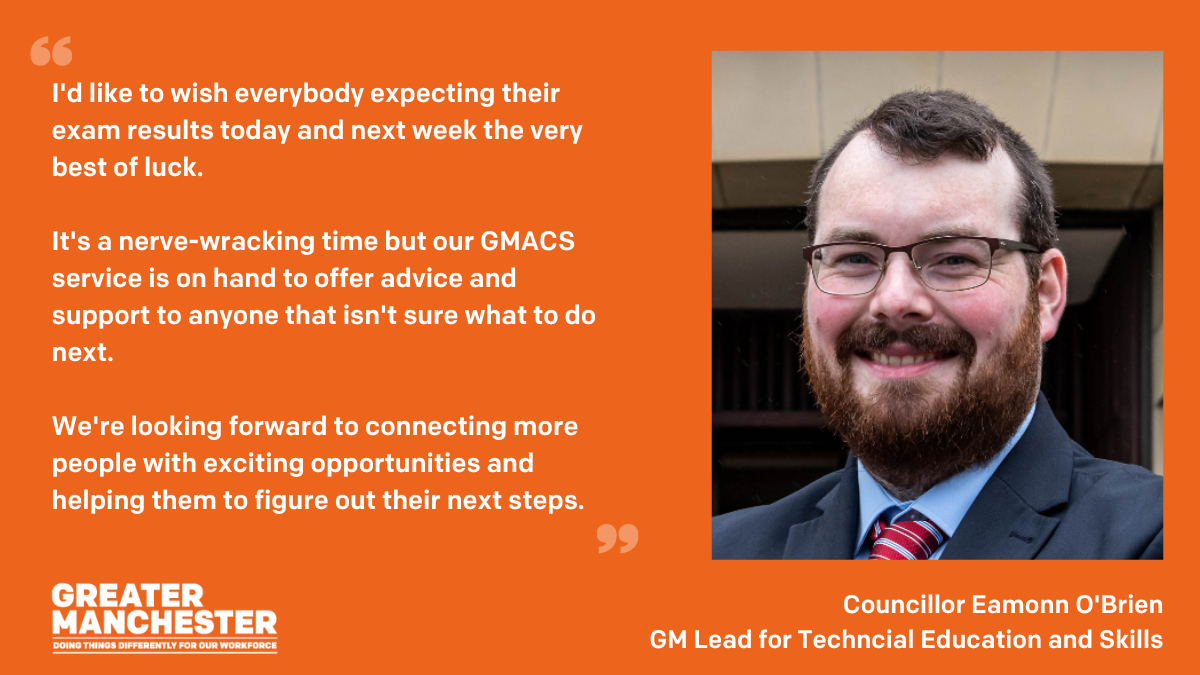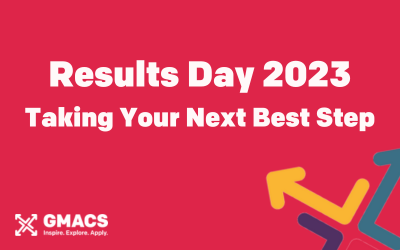Results Day 2023: Taking Your Next Best Step
It’s time for another set of results days across Greater Manchester. This year, A Level and T Level results day will be on Thursday 17th August, with GCSEs to follow a week later on Thursday 24th.
No matter how you’re feeling about your results, GMACS is here to help. If you’re worried and you want to explore your options and come up with some plans, the information here on GMACS could help you guide your research. If you’re feeling confident, you could explore what opportunities are available in your area and start thinking about your career options.
Remember that it’s totally fine to respond to results day on your own terms and in your own way. However, having all the information about which options for the future might be right for you is a good way to manage your stress. GMACS can help you figure out which pathways could suit you, and ultimately help you take your next best step.
Good luck from Councillor Eamonn O’Brien
Before we give you the low down on all the options you might be looking at after results day, we’d like to first share a good luck message from Councillor Eamonn O’Brien, Greater Manchester’s Lead for Technical Education and Skills.

Choosing your next best step
In this article, we’ll cover some of the main options you might choose after results day. Some of these options will be designed for you to take after GCSEs, while others are designed for your choices after A Levels or T Levels. But remember – many of these options can actually be taken by people of any age, so if you spot something that interests you, read further and do your research to see if it could be the right choice for you.
Staying in education? Here are some of your choices
T Levels
T Levels are new two-year technical education courses for 16-18-year-olds. These free courses are for after you’ve completed your GCSEs. If you have a good idea which career you’d like to go into, and you want to learn the relevant technical skills for that career in a classroom, T Levels could be a good choice for you.
One T Level equals three A levels and takes two years to complete. T Levels are a full time programme of study for young people aged between 16 and 18. They’re made up of practical tasks, projects and exams. The course includes a mixture of classroom and practical learning (this will make up 80% of your time) and “on the job” experience in the form of an industry placement (this will make up 20%).
T Level courses have all been written with the help of employers, so you get the knowledge and skills that you need in the workplace. T Levels are designed to make sure you’ll be ready to get a job when you qualify.
You’ll learn core skills and knowledge as part of your T Level course, and you can then choose to specialise for a specific job. For example, you could study for a Design, Surveying and Planning for Construction T Level. During the course, you could choose to specialise in civil engineering, building services design, hazardous materials and surveying or surveying and design for construction and the built environment – whichever suits you best. This makes T Levels a flexible option for people looking to join a specific sector or industry but who aren’t sure on exactly what job they’d like yet.
Your industry placement is a vital and mandatory part of your T Level course. As part of your course, you’ll need to do an industry placement lasting a minimum of 45 days. This also needs to be in an industry that’s relevant to the subject you’re studying. Your college or T Level provider will help you find a placement that’s right for you and your course.
Auzai Khan, a Digital T Level student at Oldham Sixth Form College, hailed the industry placement element of his T Level course and said it has been useful to gaining insight into the digital industry.
Auzai said: “Finally, I have completed my first year and I enjoyed every bit of it and now I’ve just completed my industry placement which was different because of never working before. At first I was not liking the sound of an industry placement. However, completing the placement was useful because if gives you an insight on how work life is – helping you to gather skills such as being organised, boosting your confidence and improving your communication skills. By doing this it gave me a better chance into getting into universities and jobs for the future because of having industry experience which students wouldn’t have who have taken a A-Level or BTEC.
“Overall, I would recommend the Digital T Level because it’s different to the rest of the courses and I feel it’s going to be the future of pathways students can take because of the industry placement factor, which gives student the upper hand to the rest of the students.”
@OSFC_Info. student, Auzai Khan shares his T Level experience:
🗣️ “I would recommend the Digital T Level… because of the industry placement factor.”
Start studying a T Level with our GMACS 👉 https://t.co/5jsJj48XYC pic.twitter.com/jgaImOGWNt
— Greater Manchester Combined Authority (@greatermcr) November 30, 2021
A Levels
A levels are academic qualifications, where you can study some of your favourite subjects from GCSE (and many new ones!) in much more depth. They’re academic and are assessed with an exam at the end.
You usually take three A levels in different academic subjects. They give you a broad knowledge of each subject that’s more advanced than GCSEs. They’re a good choice if you haven’t decided on your career and you enjoy traditional classroom-based studying.
The A level route is often referred to as the “academic pathway”. It’s often the chosen route for those wishing to progress to university or other Higher Education.
Lots of young people choose to do A levels as their post-16 education choice. A levels are excellent general qualifications that are valued by employers and universities. A levels offer a great route into Higher Education, but they’re also a good route into employment.
BTECs
BTEC stands for Business and Technology Education Council. These qualifications combine practical learning with subject and theory content. BTEC qualifications are flexible, and you can take one alongside (or instead of) GCSEs and A levels in schools and colleges.
BTECs are divided into units which cover specific areas of knowledge, skills and understanding of a particular sector or industry.
BTECs are specialist work-related qualifications, available in a range of different areas. They combine practical learning with subject and theory content.
BTECs are a type of technical qualifications, designed for young people who are interested in a particular sector or industry but aren’t sure what job they’d like to do. For example, you could study a childcare or engineering BTEC to get an overall sense of that industry without specialising into specific job roles.
You can study BTECs alongside academic qualifications like A levels, or as a standalone course. You may also study for a BTEC qualification during an apprenticeship.
Degrees
Lots of people consider degrees for further study after they’ve finished their A Levels. However, to do a degree you’ll need to have applied several months before results day – so if you haven’t done so, it’ll be something to consider for next academic year.
For more info on degrees, or to look into your options for Clearing, head over to the UCAS website.
Heading into employment? See what’s out there in GM
Apprenticeships
Earn while you learn
Apprenticeships are a great option if you want to get into work straight away and earn money while you learn the job. As an apprentice, you get lots of on the job training from your colleagues, and you also spend about one day a week doing extra training, which is all paid for. There are apprenticeships in lots of different jobs, everything from engineering to healthcare and digital marketing, and companies are hiring all the time, so have a look at the GMACS apprenticeship search page and see what might suit you.
Amy Glanville, Apprenticeships Programme Manager, GMCA
We chatted to Megan from The Juice Academy all about her apprenticeship journey including some top tips and advice if you’re picking up your results.
Your career options
If you’re thinking about different careers, it’s also helpful to consider what sort of area you might like to work in. This could be something as vague as knowing you like law, or working outside and wanting to explore related careers; or it could mean knowing that you want to definitely become a nurse or teacher.
To help you with this research, on the GMACS website we’ve got some information about the top growth sectors in Greater Manchester, as well as some sample jobs you could look at in each area.
Have a browse and explore – you might find something that sparks your imagination!
Hear from real people working in Greater Manchester
If you’re looking for jobs in GM, it might be helpful to hear from people working in the sectors that you’re looking at to find out a little bit more about what it might be like.
That’s why we created our sector videos. These short videos are with people working in GM across a huge range of different jobs, so it’s an opportunity for you to hear from them and get insight from professionals working in lots of industries.
Supported Internships
Supported internships are employment-based courses for young people with Special Education Needs and Disabilities. They offer opportunities to develop genuine employability skills and experience.
Based in real work places, they involve working alongside other working people. This enhances teamwork and social skills.
Pure Innovations is a Greater Manchester-based charity that supports people to create fulfilled lives with a sense of purpose and belonging.
Pure Innovation Supported Internships are a partnership between a host employer, e.g. a hospital or council; a college providing tuition or their own specialist employment team.
Each intern receives a support plan tailored to their needs. Their skills are matched to job roles within the employer’s organisation, like clerical, catering or portering.
The timescale mirrors the academic year and the usual format is three 10-week work placements.


